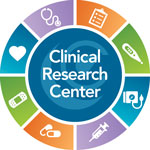By Rylee Salutregui
Clinical Research Center Intern
Ponder these facts from the Alzheimer’s Association :
- 7 million American’s are living with Alzheimer’s.
- By the year 2050, that number is projected to rise by 14 million.
- Alzheimer’s is the sixth leading cause of death in the U.S.
- In the year 2018 Alzheimer’s and other forms of dementia will cost the nation 277 billion dollars.
- Every 65 seconds someone in the U.S. develops the disease.
- 90% of what we know about Alzheimer’s has been discovered in the last 20 years.
Got your attention now?
 The way to treat, delay, and prevent Alzheimer’s is through clinical research. Many people mistakenly believe that you must “have one foot in the grave” or some unforgiving disease to benefit from a clinical trial. Clinical research cannot do what needs to be done without volunteers for their trials. Participating in a clinical trial can be beneficial for everyone – sick or healthy.
The way to treat, delay, and prevent Alzheimer’s is through clinical research. Many people mistakenly believe that you must “have one foot in the grave” or some unforgiving disease to benefit from a clinical trial. Clinical research cannot do what needs to be done without volunteers for their trials. Participating in a clinical trial can be beneficial for everyone – sick or healthy.
Sick volunteers may participate in a trial as an effort to see if this new treatment or practice could help them and to get extra attention and monitoring from a medical staff. Healthy volunteers have said that they participate in clinical research to help others and advance medical technology. Having this mix of volunteers is important for many reasons:
- Everyone is genetically different. Therefore, one treatment or practice that works for someone may not work for another.
- Every treatment, practice, medication and device that goes through clinical research has the chance of being the next big break through.
- Studying these diseases now can improve the quality of life for people in the future.
Just because a trial yields negative results does not mean that it was a failure. Clinical studies are set up by making a hypothesis and then testing it. If the hypothesis is proven inconclusive, it’s reviewed, changed accordingly and then goes through the cycle again. Alzheimer’s was first discovered in 1906. How do you think we have learned so much about the disease since then? Clinical research. Even when a trial does not produce positive results, it still pushes research further in the right direction. The way to view clinical research is by realizing that every single clinical trial leads closer and closer to a cure.
Although some may say the goal of clinical research is to get new drugs out on the market and make money, those who have committed to careers in the field would differ. They would say their goal is to help others, improve knowledge, and give those suffering from diseases a better quality of life.
To view a video showing an inside look of The Corvallis Clinic’s Clinical research Department, go to Clinic Research.
The Clinical Research Center is currently seeking volunteer participants in studies for Alzheimer’s disease, Type 1 diabetes, Type 2 diabetes and a vaccine to prevent exacerbation in peoples with chronic obstructive pulmonary disease (COPD). Click here if you’d like to be contacted about one of these studies.
If you are interested in learning more about clinical trials, contact the Clinical Research Center at 541-766-2163 or send an email to research@corvallisclinic.com. Or, follow us on Facebook at https://www.facebook.com/corvallisclinicresearch.
– Rylee Salutregui, Clinical Research Center Intern, will be graduating from Oregon State University’s College of Public Health and Human Sciences in June 2018 with a Bachelor of Science in Public Health-Health Promotion and Health Behavior with a Business minor
